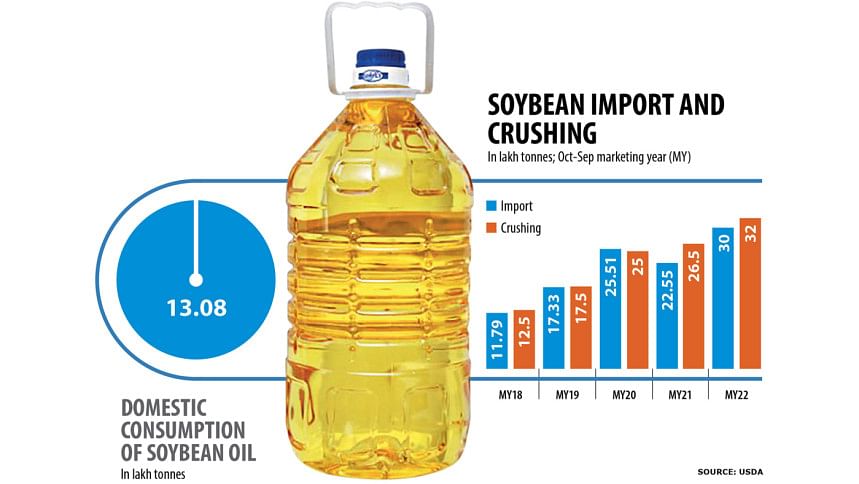Soybean imports to rise for a hike in crushing by local mills

Bangladesh's soybean imports will likely grow 33 per cent in marketing year (MY) 2021-22, beginning in October and ending in September, thanks to the increased oilseed crushing capacity of local mills.
The country, which is highly dependent on foreign markets to meet its edible oil requirement, may import 30 lakh tonnes of soybean in MY 2022, up from 22.55 lakh tonnes the previous year, the US Department of Agriculture (USDA) said in its "Oilseeds: World Markets and Trade" report released last week.
The agency forecasts soybean crushing of 32 lakh tonnes in the current marketing year, or 21 per cent higher year-on-year.
"Overall soybean crushing will rise," said Biswajit Saha, director for corporate and regulatory affairs of City Group, which operates the biggest seed crushing mill in Bangladesh.
Apart from City Group, Meghna Group of Industries and Globe Pharma Group of Companies are engaged in crushing oilseed to market soybean oil as well as act as key suppliers of soya meal for the huge animal and fish feed industries.
Bangladesh requires 20 lakh tonnes of soybean meal, 80 per cent of which comes from local seed crushing mills, according to industry operators.
"Local mills have the collective capacity to crush 52 lakh tonnes of seed annually and all of the seed crush mills process roughly 27 lakh tonnes each year," said Saha of City Group, which produces soya meal and rapeseed cakes from oilseed mainly imported from Latin America.
Md Shafiul Ather Taslim, finance director of TK Group, said the company's mills, established at Muktarpur, Munshiganj are almost ready.
Crushing at the mills, which have a daily seed pressing capacity of 2,500 tonnes, has been delayed for volatility in the price of soybean in the international market,
"But we expect to start the mill in three months," he added. USDA data showed that Bangladesh's annual imports of soybean oil has been falling due to increased seed processing by local mills.
The country, which imported 8.59 lakh tonnes of soybean oil in MY 2018, is forecasted to bring in 6.8 lakh tonnes of edible oil in the current marketing year.
However, consumption of soybean oil is projected to rise 7 per cent to 13.23 lakh tonnes in MY 2020-21, up from 12.41 lakh tonnes the previous year.
"We are gradually shifting away from crude oil imports to seed," Taslim said.
City Group's Saha said the rate of value addition for seed crushing is higher for local mills and the export of soymeal last year was a testament to that.
Exports came to a stop after the government slapped a ban in October 2021 in the face of demand from local feed millers, poultry and dairy producers on the grounds of soaring feed prices.
The USDA also projected a recovery in Bangladesh's yearly consumption of vegetable oil to 30 lakh tonnes in MY 2022 from 29.8 lakh tonnes the previous year. The nation consumed 33 lakh tonnes of edible oil in MY 2020, USDA data shows.
Local farmers grew soybean on 78,700 hectares of land to bag 1.35 lakh tonnes of soybean in the 2020-21 fiscal year ending in June, according to data from the Department of Agricultural Extension (DAE), which aims to bring 79,000 hectares under cultivation in the current fiscal year.

 For all latest news, follow The Daily Star's Google News channel.
For all latest news, follow The Daily Star's Google News channel. 



Comments